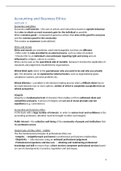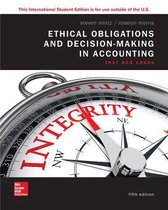Accounting and Business Ethics
Lecture 1
Economics and ethics
Economics (self-interest) = the sum of actions and interactions based on egoistic behaviour
that aims to obtain as much economic gain for the individual as possible.
Ethics (common good) = composed of generous actions that aims at the good for everyone
and the common good for the community.
This creates an oxymoron (contradiction).
Ethics and morals
Ethics and morals are sometimes used interchangeably, but they are different:
- Ethics refer to rules provided by an external source, such as codes of conduct.
- Morals refer to an individual’s own principals regarding right and wrong and are
influenced by religion, culture or country.
Ethics can be seen as the operational side of morality, because it involves the application of
standards and judgements established by organizations.
Ethical blind spots refers to the gap between who you want to be and who you actually
are. This deviation can be explained by external factors, such as organizational goals,
compliance systems, personal problems etc.
Ethical dilemma = a problem in the decision-making process when a difficult choice has to
be made between two or more options, neither of which is completely acceptable from an
ethical perspective.
Integrity
Integrity is a fundamental trait of character that enables a CPA to withstand client and
competitive pressures. A person of integrity will act out of moral principle and not
expediency (e.g. convenience).
Accounting and business ethics
A CPA deals with a huge number of interests. In order to restore trust and confidence in the
accounting profession, attention must be brought to ethics and integrity.
Public interest = the collective well-being of the community of people and institutions that
the profession serves.
Global Code of Ethics (IFAC – IASBA)
The five fundamental principles of professional ethics are:
- Integrity →straightforward and honest in professional and business relationships.
- Objectivity → take decisions using an unbiased professional judgement.
- Professional competence and due care → attaining and maintaining professional
knowledge and skill to ensure that a client receives competent professional services based
on current developments in practice, legislation and techniques.
1
,- Confidentiality → respecting the confidentiality of information acquired and, therefore,
not disclosing such information to third parties without authority, unless there is a legal or
professional right or duty to disclose.
- Professional behaviour → complying with relevant laws and regulations and avoid any
actions that discredits the accounting/auditing profession.
AICPA Code of Conduct
Principles:
- Responsibilities → the overriding responsibility of CPAs is to exercise professional and
moral judgement in all activities.
- The public interest → take care of all individuals who rely on the objectivity and integrity
of the CPA.
- Integrity → the public trust is served by being honest, and not compromising honesty with
personal gain and advantage.
- Objectivity and independence → maintaining a attitude of impartiality and honesty and
being free of conflicts of interest in meeting responsibilities.
- Due care → continued improvement in the level of competency and quality of services.
- Scope and nature of services → determine whether the scope and nature of other services
provided to a client would create a conflict of interest in performing an audit for that client.
Independence
Independence allows a CPA to act with integrity, objectivity and professional scepticism.
Two types of independence:
- Independence in fact → exists when the accountant is able to maintain an unbiased
attitude throughout the audit, that allows the accountant to act with integrity, objectivity
and professional scepticism.
- Independence in appearance → the result of others’ interpretations of the independence
in fact.
A risk-based approach for analysing threats to independence:
- identify and evaluate threats to independence, and;
- determine whether safeguards already eliminate or sufficiently reduce identified threats
to an acceptable level and whether threats that have not yet been reduced can be
eliminated or sufficiently reduced by safeguards, and;
- if no safeguards are available to eliminate or reduce the threat to an acceptable level,
independence would be considered to be impaired.
Threats to independence:
- Financial self-interest
Occurs when a CPA could benefit from a financial interest in an assurance client.
Examples = firm being concerned about the possibility of losing a significant client,
firm being fee dependent on a client.
- Self-review
Occurs when a CPA reviews evidence during an assurance engagement that is based
on her own or her firm’s non-assurance work.
Example = preparing source documents used to generate the client’s F/S.
2
, - Advocacy (represent the company)
Occurs when a CPA (seems to) promote a client’s position or opinion.
Examples = selling or promoting financial securities of an assurance client, acting as
the client’s advocate in a legal proceeding.
- Familiarity (too much trust)
Occurs when a CPA becomes too sympathetic to the client’s interest because he has
a close relationship with the client, its directors, officers or employees.
Examples = member of the engagement team having a family member who works at
the client, accountant accepting gifts or preferential treatment from a client, senior
personnel having a long association with the client.
- Undue influence
Occurs from an attempt by the management of the client to coerce the CPA or
exercise excessive influence over the CPA.
Example = a threat to replace the CPA because of a disagreement with the client.
- Adverse interest
When a CPA takes actions that are in opposition to an client’s interests or positions.
Example = (expressed intention of) commencing litigation by either the client or the
CPA against the other.
- Management participation
Occurs when a CPA takes on the role of client management or otherwise performs
management functions on behalf of the client.
Example = establishing and maintaining internal controls for the client.
Safeguards fall into two broad categories:
1. Safeguards created by the profession, legislation or regulation
Examples = educational, training and experience requirements to become certified,
continuing education requirements, external reviews of a firm’s quality control
system, rules or legislation governing the independence requirements of the firm.
2. Safeguards in the work environment
* Implemented by the firm
Examples = policies and procedures to implement and monitor quality control
of engagements, leadership of the firm that stresses the importance of
compliance with the fundamental principles, policies and procedures
addressing compliance with laws and regulation.
* Implemented by the client
Examples = tone at the top that emphasizes the client’s commitment to fair
financial reporting, such as an active audit committee, policies and procedures
to address ethical conduct.
Lecture 2
The grey area
The law:
- Being ethical is not the same as following the law
- Existence of specific laws prohibiting certain behaviours will not stop a person who is
unethical from violating those laws
- Sometimes ethical people go beyond what the law requires because the law cannot
cover every situation you might encounter
3






